A bulldozer stands on piles of debris after the government sent in a demolition squad. Protestors shout slogans as they are dragged away by police dressed in riot gear, while others chain themselves to gates and doors. This is the battle over Taipei’s Huaguang Community (華光社區) — the latest symbol in the struggle of the poor and the underprivileged against the rich and the powerful. More than 50 students and residents were arrested during clashes with police in April, and the question of police brutality was raised. The majority of residents were forced to tear down their own homes. Some still don’t know where they are going to live.
Broken government promises
For Huaguang residents, the forced eviction and demolition was completely unexpected as city and central government officials had made repeated promises over the years to help them resettle. During his two terms as Taipei mayor, Ma Ying-jeou (馬英九) promised residents a resettlement plan. Instead, Huaguang inhabitants were slapped with government lawsuits that claimed they were illegally occupying the land.
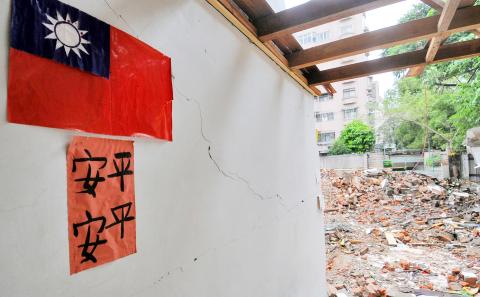
Photo: Taipei Times
“All communications have stopped. The government only speaks of demolishing the community, and no longer talks about resettlement,” says Mr Lee (李先生), who only wants his surname used for fear that he will be harassed by the government.
Hsu Yi-fu (徐亦甫), a leader in the Huaguang Student Team which lobbies on behalf of Huaguang residents, says that by changing the development plan from an urban renewal project to directly leasing the state-owned properties to corporations, the government is evading its responsibility to take care of its citizens.
“The Ministry of Justice (MOJ) says it is only responsible for removing everything from the property and anything beyond that is the responsibility of another department. The cleared land will be leased out for further development, and no one is responsible for the people who have been living on it,” Hsu Yi-fu says.
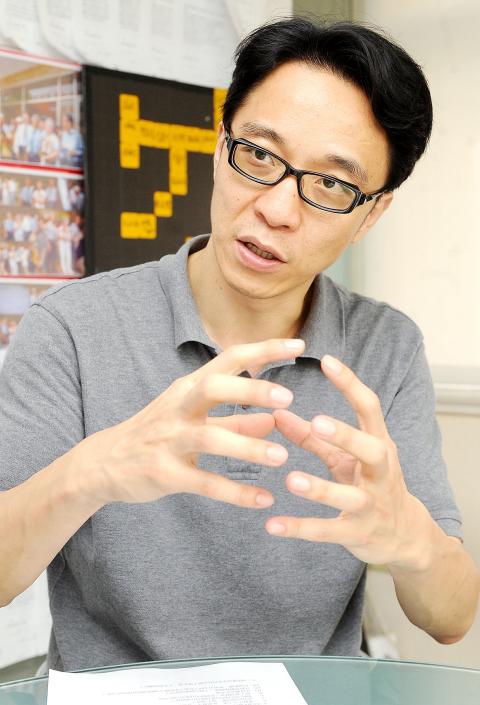
Photo: Taipei Times
Shih Yi-hsiang (施逸翔), executive secretary of the Taiwan Association for Human Rights (台灣人權促進會, TAHR), echoing Hsu Yi-fu’s sentiment, says that one of the difficulties facing Huaguang is bureaucratic circumvention.
“You go to the Taipei City Government, they say it’s the central government’s business. You question the Ministry of Justice, they say it is not up to them to decide. So you ask the Executive Yuan, and the only answer you get is that everything is done in accordance with the law,” Shih says.
According to the law?
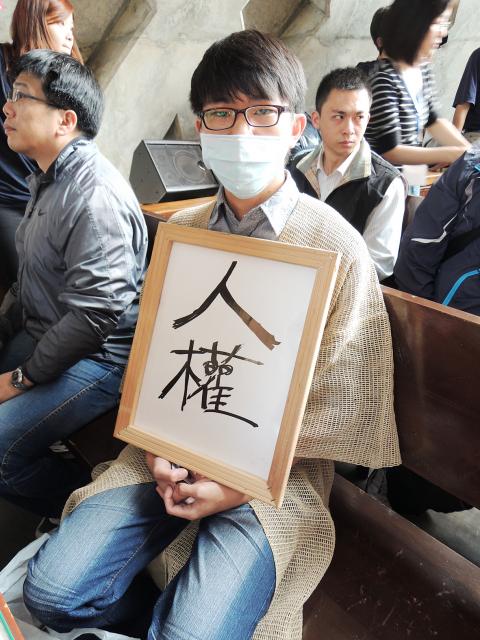
Photo: Taipei Times
Kao Jung-chih (高榮志), a lawyer and office director for the Judicial Reform Foundation (JRF, 民間司法改革基金會), believes that the problem lies exactly in the government’s legal action. By resorting to civil suits to solve its disputes with residents, the government conveniently uses private law, which involves interactions between private citizens, to tackle what should be addressed in the realm of public law, which governs relationships between individuals and the state, he says.
“The thinking behind public law is that the state has so much more power and resources than the general public so its behavior needs to be restrained and conform to certain principles. In private law, individuals are viewed as equals, and the law should impose as little restraint as possible,” Kao explains.
What is more confusing is that when the residents ask the government, their creditor, to waive or reduce the fines, the Ministry of Justice (MOJ) insists that as a government body, it has to act according to administrative law and cannot waive their debts.
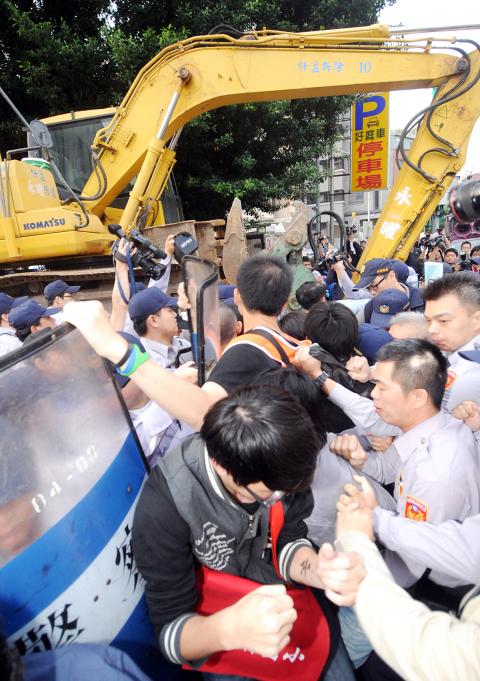
Photo: Taipei Times
“The government uses whichever law works in its favor. That’s the problem,” the lawyer says.
Kao also points out that in recent years, civil actions brought by the government against inhabitants living on state-owned properties have increased in number as the penalty for illegal profiting (不當得利) is an effective way to force people to leave.
“In cases such as the Sanying Aboriginal Community (三鶯部落), they used an administrative order to force them to leave. Now they use lawsuits,” he says. “Law has become a tool to rule.”
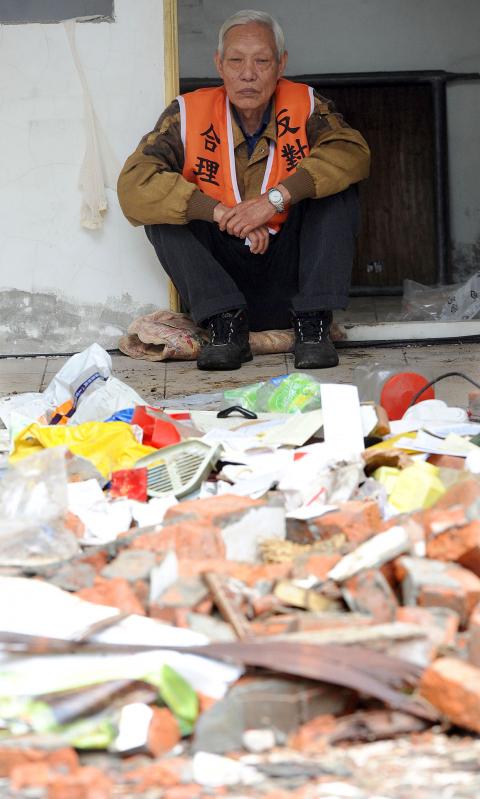
Photo: Taipei Times
Illegal occupation
Like Treasure Hill (寶藏巖) and the long demolished veterans’ settlement where Linsen Park (林森公園) now stands, Huaguang also raises the issue of squatter communities. It shows that the government, in its handling of the communities and their inhabitants, is unwilling to recognize the historical context in which the settlements were formed and tackle its inadequate housing policy over the years.
In the 1940s when the Chinese Nationalist Party retreated to Taiwan, they brought with them over a million soldiers and civilians from China. Most of them settled in informal housing quarters like Huaguang. During the 1960s and 1970s, people from the countryside constituted a second wave of immigrants to the urban areas. Official statistics show that in 1963, one third of the population in Taipei lived in squatter settlements, Hsu Yi-fu says.
To Huaguang resident Wang Yu-chi (王禹奇), the informal living quarters are the result of citizens taking up the responsibility to solve housing shortages.
“It was basically a government-in-exile that brought with it a large number of refugees who left their homes, families and everything else behind and tried to survive in a foreign land,” Wang says.
“What should have been the government’s job became the responsibility of the individual.”
John Liu (劉可強), executive director of the National Taiwan University Building and Planning Research Foundation (台灣大學建築與城鄉研究發展基金會), agrees. He says that the issue of so-called squatter settlements is a very complex one.
“It shouldn’t be called a squatter settlement. Rather, it is a type of urban dwelling developed in a specific historical context,” the urban planning professor and activist says.
For Shih, ignoring the historical background and stigmatizing inhabitants as illegal occupants is “utterly unacceptable.”
“But Huaguang’s case is much more difficult to tackle than with, say, the Wang (王) family [in the Wenlin Yuan (文林苑) urban renewal project] due to our fixation with private property ownership.”
The right to housing
While private ownership is a defining feature of a capitalist society like Taiwan, Kao says that civil law respects the connection people have to the land they live on.
“The longer people live in a place, the deeper the emotional bond they will have. The law respects and places emphasis on the rights of those who actually live on the land,” Kao explains. “The issue of informal settlement can only be solved when we shift from the idea of private property to the protection of the right to housing.”
In 2009, President Ma ratified the UN’s International Covenant on Civil and Political Rights and the International Covenant on Economic, Social and Cultural Rights, which recognizes the right of everyone to an adequate standard of living including adequate food and housing. According to the Committee on Economic, Social and Cultural Rights (CESCR), a body of independent experts that monitors implementation of the latter covenant, forced evictions are the major cause of violating people’s right to adequate housing.
In February, a group of international human rights experts were invited by the government to review Taiwan’s implementation of the two covenants. Citing the forced eviction of the Huaguang residents as an example, the reviewers urged the evictions to be stopped unless alternative housing is provided. The experts also suggested amending related laws and regulations to prevent similar infringements in the future.
In response, Premier Jiang Yi-huah (江宜樺) claimed the right to housing does not extend to people living on government property illegally.
To activists like Shih and Kao, the irony lies in the fact that while the MOJ is in charge of overseeing the implementation of the two covenants since their adoption as domestic law, it takes the lead in breaking them.
Plutocracy
Both Liu and Hsu Shih-jung (徐世榮), a professor at National Chengchi University’s Department of Land Economics, believe that public land has become a commodity that the financially strapped government easily cashes in on by either selling or leasing it out to big corporations and land developers. Meanwhile, ordinary people can’t afford somewhere to live.
Kao of the JRF points out that the lack of transparency in government development projects suggests a hidden web of political cronyism and corruption.
“They say they need to clear the land first, which is ridiculous because evictions should always be the last resort. And they don’t tell you how exactly the land is used. Who is behind the project is not revealed. You don’t know whom you are fighting against, since the face of the enemy is too vague to be recognized,” the lawyer notes.
Public land or government land
Apart from Huaguang, several government properties in Taipei including Taipei Academy (台北學苑) and the site where the Air Force Headquarters was located have jumped on the build-operate-transfer (BOT) bandwagon. One of the highest-ranking advocates of the land development projects is the Supervisory Team for Cleaning and Reviving State-Owned Land (國有土地清理活化督導小組). Convened by the premier or vice premier and composed of ministers and other top-ranking officials in the central government, the cross-ministry team was set up in 2009 with an aim to revive public land and put it to effective use. But the problem is that despite its considerable influence on land use, the team makes its decisions in closed-door meetings, without any participation or supervision by an independent body, Hsu Yi-fu notes.
Huang Li-ling (黃麗玲), an associate professor at the National Taiwan University’s Graduate Institute of Building and Planning, agrees. In an article, From Public City to Private City: Falling of Taipei in the Fever of Urban Renewal (從公共化到產權化:都更城市淪亡記), Huang says the Supervisory Team promotes development projects on state-owned land. But how the land should be used to benefit the public is rarely discussed, and public land is often merely viewed as real estate for commercial uses.
Back in Huaguang, the social housing offered by the Taipei City Government after the residents’ months long protests and demand for a relocation plan is among the most popular topics of conversation. Apart from the six low-income households who are eligible for the low-cost housing units in Wenshan District (文山) and Wanhua District (萬華), the economically disadvantaged inhabitants are given a choice of the public housing with a monthly rent for one unit ranging from between NT$12,500 and NT$14,500. The maximum tenure is three years.
Most residents find the offer less than viable because with their fines and salaries partially seized, many can’t afford to live in public housing.
For Wang, what is gone with the demolition of the community is the memory of the city and the people who once lived here.
“From my father’s generation who came to Taiwan and had families here to those who moved from the countryside to the city seeking better lives, they are the people who laid the foundation upon which all the glitz and grandeur are built. Now they are gone and forgotten,” he says. “I wish there was some way to tell people that we were once here, lived our lives during turbulent moments in history.”
Currently there are some 20 households remaining in Huaguang. The MOJ says the demolition will be completed by September.

That US assistance was a model for Taiwan’s spectacular development success was early recognized by policymakers and analysts. In a report to the US Congress for the fiscal year 1962, former President John F. Kennedy noted Taiwan’s “rapid economic growth,” was “producing a substantial net gain in living.” Kennedy had a stake in Taiwan’s achievements and the US’ official development assistance (ODA) in general: In September 1961, his entreaty to make the 1960s a “decade of development,” and an accompanying proposal for dedicated legislation to this end, had been formalized by congressional passage of the Foreign Assistance Act. Two

Despite the intense sunshine, we were hardly breaking a sweat as we cruised along the flat, dedicated bike lane, well protected from the heat by a canopy of trees. The electric assist on the bikes likely made a difference, too. Far removed from the bustle and noise of the Taichung traffic, we admired the serene rural scenery, making our way over rivers, alongside rice paddies and through pear orchards. Our route for the day covered two bike paths that connect in Fengyuan District (豐原) and are best done together. The Hou-Feng Bike Path (后豐鐵馬道) runs southward from Houli District (后里) while the

March 31 to April 6 On May 13, 1950, National Taiwan University Hospital otolaryngologist Su You-peng (蘇友鵬) was summoned to the director’s office. He thought someone had complained about him practicing the violin at night, but when he entered the room, he knew something was terribly wrong. He saw several burly men who appeared to be government secret agents, and three other resident doctors: internist Hsu Chiang (許強), dermatologist Hu Pao-chen (胡寶珍) and ophthalmologist Hu Hsin-lin (胡鑫麟). They were handcuffed, herded onto two jeeps and taken to the Secrecy Bureau (保密局) for questioning. Su was still in his doctor’s robes at

Mirror mirror on the wall, what’s the fairest Disney live-action remake of them all? Wait, mirror. Hold on a second. Maybe choosing from the likes of Alice in Wonderland (2010), Mulan (2020) and The Lion King (2019) isn’t such a good idea. Mirror, on second thought, what’s on Netflix? Even the most devoted fans would have to acknowledge that these have not been the most illustrious illustrations of Disney magic. At their best (Pete’s Dragon? Cinderella?) they breathe life into old classics that could use a little updating. At their worst, well, blue Will Smith. Given the rapacious rate of remakes in modern